Planning to take your business online and not sure whether to go ahead with BigCommerce or Shopify? Our detailed BigCommerce vs Shopify comparison is the perfect solution to your dilemma.
Both of them are popular eCommerce enablement platforms, each with its own unique set of features. Currently, more than 5.6 million companies use Shopify for their website, and about 600K businesses use BigCommerce.
BigCommerce and Shopify both have their pros and cons. One platform is better than the other in some aspects and vice versa. So ultimately, the decision comes down to what features & functionality are important to you and your business.
In this article, we’ll compare BigCommerce and Shopify, looking at important factors like design flexibility, features, pricing, and more. By the end, you’ll have a clear idea of which platform is the best fit for your business.
BigCommerce vs Shopify: An Overview
Let’s have a quick overview of both the platforms:
| BigCommerce | Shopify |
|---|---|
| The platform has a steep learning curve. | Doesn't require much technical knowledge, and is better for beginners |
| Provides video tutorials . | Provides comprehensive blogs as tutorials. |
| BigCommerce has an extensive library of built-in tools. | Shopify doesn’t offer as many built-in tools a BigCommerce but offers plenty of add-ons via its app store |
| Doesn't charge any transaction fees. | Charges small transactional fees. |
BigCommerce vs Shopify: Key Differences
1. Ease of Use
BigCommerce
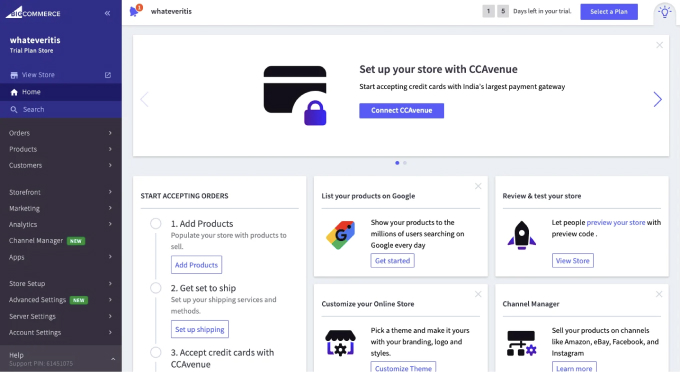
BigCommerce is not an ideal choice for beginners as its user interface is too technical. The platform also uses a lot of technical terminology on its dashboards, so one may have to spend time researching those terms.
That being said, BigCommerce does provide an extensive knowledge base in the form of video tutorials and blogs to help you better understand the platform.
Shopify
Shopify is much more straightforward and user-friendly as compared to BigCommerce. It has a clean interface with everything clearly labeled. Even if you are new to website building, you will be able to get started with Shopify without any difficulties.
The platform also offers comprehensive guides that can help you in case you get stuck during any process. With Shopify, you can get access to their wizarding tool that assists you in setting up your online store step-by-step. It is an excellent platform for businesses that are just starting out with their online presence.
Our verdict for best ease of use: Shopify
2. Design Flexibility
BigCommerce
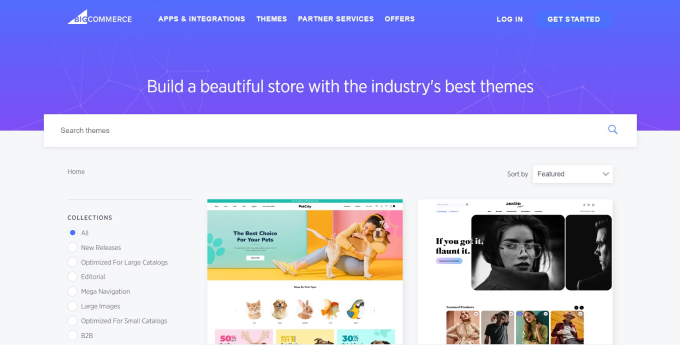
If you want complete control over the design of your website, BigCommerce is a good option. With its drag-and-drop feature, the platform provides users with a lot of customization options. You can change the color, font, layout, and more to create a website that perfectly represents your brand.
BigCommerce also offers a wide range of stunning themes created by third-party developers.
Shopify
Shopify also provides users with professional themes. These themes come in different styles and can be used for a wide range of businesses. The platform allows users to customize their website’s design to some extent. However, you will not have as much control as you will with BigCommerce.
Both platforms allow you to use coding to change the look and feel of your site. Overall, BigCommerce offers more design customization options than Shopify. However, Shopify’s themes are more professional and sleek-looking.
Our verdict for best design flexibility: BigCommerce
3. Product Options & Categorization
BigCommerce
BigCommerce provides users with a lot of options when it comes to products. You can add an unlimited number of products to your website and create as many categories and subcategories as you want.
The platform also allows you to offer product variations such as size, color, etc. BigCommerce makes it easy for customers to find the products they are looking for by allowing you to use filter tags.
Shopify
With Shopify, you can also add an unlimited number of products to your online store. The platform makes it easy to categorize and organize your products into collections. You can also create filters so that customers can easily find what they are looking for.
Shopify also allows you to offer product variations. You can access various other applications on Shopify App Store that can allow you to add several features like customized swatches, product bundles, automated variant image swatches etc., to provide a better user experience.
Overall, we would say Shopify provides users with better options when it comes to products and their categorization.
Our verdict on best product options & categorization: Shopify
4. Sales Features
BigCommerce
BigCommerce provides users with a lot of built-in sales features. This means you won’t have to scout for third-party apps to look for features that are necessary for your online store.
Some of the sales features of BigCommerce are:
- Discounting Tools: BigCommerce offers several tools in its robot dashboard that allows you to reward your customers with shipping discounts, flash sales, promotions, etc., in just a few clicks.
- Product Upsells & Cross-sells: BigCommerce provides users with the ability to effortlessly create product upsells and cross-sells. This is a great way to increase your average order value and boost your sales.
- Marketplaces: BigCommerce has collaborated with Walmart, which can allow you to directly sell your products on the Walmart Marketplace. This means you will be able to reach a larger audience in less time and boost your sales.
Shopify
Contrary to BigCommerce, with Shopify, you won’t get as many built-in features, but you can add them via the platform’s app marketplace. This requires more effort, as you will have to look through a number of applications to find what best suits you.
While there are many apps that are free to use, you would have to make some extra payments to access some of them.
Here are some of the top sales features you can get with Shopify:
- Shopify-Facebook Integration: You can easily integrate your Shopify store with Facebook. The feature allows your customers to purchase products directly from Facebook, resulting in improved reach and sales.
- Shopify Analytics: Shopify Analytics is a great way to track your store’s performance. The feature gives you insights into your customers, orders, traffic, and more. This can help you take the necessary steps to improve your sales.
- Customer Profiles: Shopify provides users with the ability to create customer profiles. This is a great way to keep track of your customer’s purchase history and make your marketing more personalized.
We would say that BigCommerce provides you with better sales features than Shopify due to its built-in tools. However, this doesn’t mean that Shopify is not a good option. If you are looking for more customizable features, then Shopify is the way.
Our verdict on best sales features: BigCommerce
5. Dropshipping
BigCommerce
BigCommerce provides users with the ability to dropship products. Dropshipping is a great way to start an online business without taking the load of carrying any inventory yourself. With BigCommerce, you can connect your store to various dropshipping suppliers in just a few clicks.
Here are some of the popular dropshipping suppliers on BigCommerce:
- AliExpress: BigCommerce allows you to collaborate with AliExpress, which is one of the most popular dropshipping suppliers. This means your shipping requirement will be taken care of by AliExpress.
- Dropified: As the name hints, Dropified is an application that allows you to dropshipping by giving access to various suppliers. The application also automates your inventory.
- e-Product Plug: e-Product Plug is another app that allows you to connect your store to various dropshipping suppliers.
BigCommerce also offers built-in tools that can help you automate your dropshipping business. For example, the BigCommerce Order Processor can automatically send orders to your supplier and update tracking information on your behalf.
Shopify
Shopify also provides users with the ability to dropship products. You can connect your Shopify store to various dropshipping suppliers and add products to your store without having to worry about stock or fulfillment.
Let’s take a look at some of the most popular dropshipping suppliers on Shopify:
- DropshipMe: DropshipMe is a popular dropshipping supplier on the Shopify App Store that connects your store to various suppliers.
- Spocket: With Spocket, you can dropship and supply your products in the US, EU, Australia, and Brazil in just 3-5 days.
- Printify: Printify is a print-on-demand supplier that offers several logistics solutions like printing, sourcing, and shipping.
You can also get AliExpress on Shopify. Both BigCommerce and Shopify offer more or less the same options for dropshipping.
Our verdict on the best dropshipping features: It’s a tie!
6. Add-ons & Extensions
BigCommerce
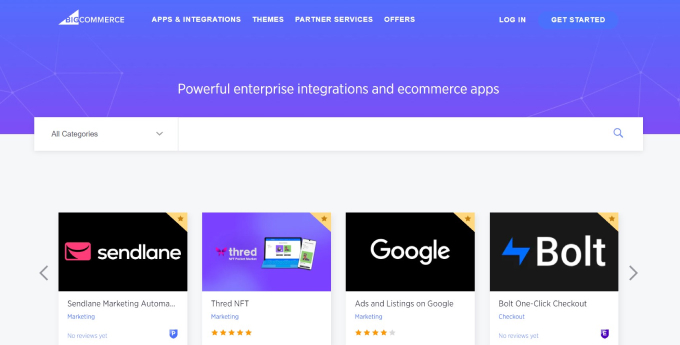
BigCommerce offers a wide range of add-ons and extensions to help you extend the functionality of your store.
Some of the popular BigCommerce add-ons and extensions are:
- Justuno: Justuno is a marketing app that allows you to create pop-ups and other forms to capture leads. This is a great way to improve conversions. It also provides the users with robust traffic segmentation and conversion analytics.
- Okendo: Okendo is an eCommerce tool that lets you automate all the tedious tasks involved in your operations. It also has pre-built templates to assist you in managing your workflow.
- Price Lists Import & Export: This BigCommerce add-on allows you to easily manage your product pricing. It is a great application if you want to show variable prices to website visitors. For example, you can easily show different pricing to regular visitors and larger vendors.
Shopify
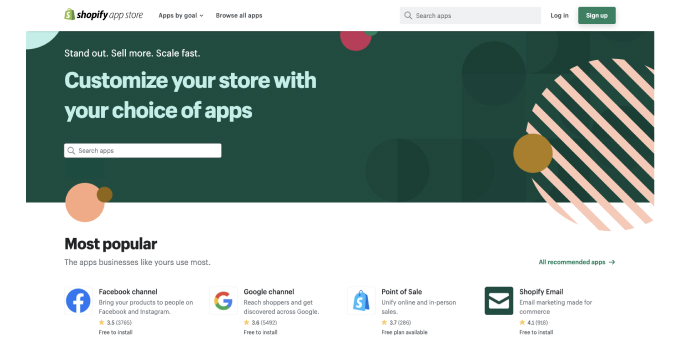
The add-ons and extensions provided by Shopify are developed by third-party developers. Here are some popular Shopify add-ons and extensions are:
- Shopify Email: Shopify Email is an app that allows you to create and send automated emails to your customers. The app allows you to make branded emails in minutes with its drag-and-drop feature. You can also easily track your email marketing campaigns and gain insights to improve them.
- Shopify Order Printer: Shopify Order Printer is an app that allows you to print invoices, packing slips, and shipping labels. It improves your store’s efficiency and accuracy.
- Shopify Tidio: Shopify Tidio is an app that allows you to add live chat & chatbot to your store. With these features, you provide better customer support to your audience, which can improve the experience of the shoppers.
The add-ons and extensions offered by both platforms can be very helpful in providing a superior customer experience, marketing, and several other essential tasks. However, Shopify gets a light edge over BigCommerce in this section due to its larger library of add-ons.
Our verdict for the platform with the best add-ons & extensions: Shopify
7. SEO Strength
BigCommerce
BigCommerce provides users with all the basic SEO features that are necessary to optimize a website for search engines. BigCommerce also offers an advanced SEO tool called BigCommerce Enterprise SEO. This tool is designed for larger businesses that need more power to optimize their website for search engines.
Let’s take a look at some of the best SEO features of BigCommerce:
- Accelerated Mobile Pages: BigCommerce Accelerated Mobile Pages (AMP) is a feature that allows you to create AMP versions of your web pages. These pages are designed to load faster on mobile devices. This can improve the user experience of your website visitors and also help you rank higher in Google search results.
- Structured Website: BigCommerce provides you with a well-structured website that is easy for search engine crawlers to index.
- Customizable URLs: BigCommerce gives you complete freedom to customize the URL of your web pages. This is a great way to optimize your website for specific keywords.
Shopify
Shopify also offers all the basic SEO features that are necessary to optimize a website for search engines. In addition, Shopify has an app called Shopify SEO by Yotpo. This app provides users with advanced SEO features to help them improve their website’s ranking in search results.
Here are some of the best SEO features of the platform:
- Automatic Sitemaps: Shopify automatically generates sitemaps for your website. This is a great way to improve the SEO of your website as it helps search engines index your web pages more easily.
- Google Shopping Integration: Shopify allows you to integrate your website with Google Shopping so that your products can get more exposure in Google search results.
- Rich Snippets: Shopify allows you to add rich snippets to your website. Rich snippets are pieces of code that provide additional information about your web pages in search results. This can help improve the click-through rate of your website.
Both BigCommerce and Shopify offer users with all the basic and advanced SEO features that are essential to optimize a website for search engines. However, BigCommerce wins this round of comparison due to its better SEO features, and it also gives a much more customized URL than Shopify.
Our verdict for the platform with the best SEO features: BigCommerce
8. Payment Gateways
BigCommerce
BigCommerce has 65-pre integrated payment processors that allow you to accept payments from over 100 countries. All the payment processing options can be set up in just one click. The platforms provide you with all the popular payment methods like:
- Paypal
- Stripe
- Authorize.Net
Shopify
Shopify offers over 100 payment gateways with access to widely used payment methods such as:
- Paypal
- CC Avenue
- Amazon Pay
Additionally, Shopify also has its own payment process called Shopify Payments, which is very easy to add to your website. Both platforms accept payments via credit and debit cards. However, Shopify charges transition fees of its own on every payment, while BigCommerce doesn’t charge anything. That’s why BigCommerce gets a win on this one.
Our verdict for best payment gateways: BigCommerce
9. Customer Support
BigCommerce
BigCommerce provides excellent customer support to its users. You can contact the support team 24/7 via phone and email. On top of that, you can also reach out to them through various social media channels like LinkedIn, Facebook, and Twitter.
The platform also has a community where you post your queries and also get to know what solutions to the problems faced by other BigCommerce users. BigCommerce also constantly posts blogs and FAQs in the community.
Shopify
Shopify also offers 24/7 customer service via phone, live chat, and email. You can also get your doubts solved with Shopify Forum. However, as the platform has more community members than BigCommerce due to its huge user base, you can get your questions answered more quickly on Shopify Forum.
While both the platforms, over similar channels for communications, Shopify’s customer support team is more prompt than BigCommerce’s customer support team.
Our verdict for best customer support: Shopify
10. Pricing
BigCommerce
BigCommerece has three different plans with fixed prices starting from $29.95/month to $299.95/month and one Enterprise plan with variable prices, which can give you access to more exclusive features.
Here are different plans offered by BigCommerce:
| Plan | Monthly (when billed monthly) | Monthly (when billed yearly) |
|---|---|---|
| Standard | $29.95 | $29.95 |
| Plus | $79.95 | $71.95 |
| Pro | $299.95 | $269.96 |
| Enterprise | Custom | Custom |
You can also try BigCommerce’s 15-day free trial before switching to their paid plans and get a good idea of what the platform can offer to your online store.
Shopify
Shopify also offers three different plans with a fixed price and another plan named Shopify Plus with variable pricing. The cost of Shopify Plus will vary according to your requirements. From the below pricing table, you can see that Shopify also offers similar pricing to BigCommerce along with a 14-day free trial.
| Plan | Monthly | Transaction Fees |
|---|---|---|
| Shopify Starter | $5 | - |
| Shopify Lite | $9 | 2.7% per in-person transaction |
| Basic Shopify | $29 | 2.9% + 30 cents per online transaction; 2.7% per in-person transaction |
| Standard Shopify | $79 | 2.6% + 30 cents per online transaction; 2.5% per in-person transaction |
| Advanced Shopify | $299 | 2.4% + 30 cents per online transaction; 2.4% per in-person transaction |
| Shopify Plus | Starting at $2000 | 0.15% per transaction (for third-party payment processors only) |
So the question that arises is, which platform has more hidden chargers?
As said earlier, BigCommerce comes with many built-in features that can assist with sales, marking, inventory management, etc. To get those same features, you may require to buy add-ons & extensions from Shopify App Store. That’s why BigCommerce can give you better value for your money.
Our verdict for the platform with the best pricing: BigCommerce
Conclusion
So, this brings us to the end of our BigCommerce vs Shopify comparison article. We hope that by now, you must have gotten a clear idea about which platform can be better for your eCommerce business needs.
The answer to the question, “which platform to choose?” would depend on what are your requirements for your online store.
If you have technical knowledge of website building, then BigCommerce would be a better platform for you, as you would be able to make better use of its customization options. However, if you are just starting out with your ecommerce business, then Shopify can also be a good option for you as it is very easy to use and get started with.
Further reading
- If you are not completely sold on BigCommerce, there are other great alternatives to it that you can try. Check out our BigCommerce alternatives article to check them out.
- Shopify has a fair bit of learning curve attached to it. If you are looking for user-friendly alternatives to Shopify, here’s an article for you.
However, if you feel like you need something more from your website builder, visit Dukaan.
Dukaan is an eCommerce enablement platform that lets you set up your online store in just 30-seconds. With our platform, you can get access to several business tools that can offer a customer-centric shopping experience.
Visit Dukaan, and get your 7-day free trial!
FAQs
1. Which platform can give my online store a better reach?As BigCommerce has a tie-up with Walmart Marketplace, it can give a better reach than Shopify. Although, if you are looking for a user-friendly, highly intuitive eCommerce platform with advanced SEO functionalities, you should give Dukaan a try.
2. How does BigCommerce & Shopify charge per sale?
BigCommerce doesn’t charge you any fees. However, Shopify charges between 2% – 0.5% of every transaction you make, depending on your chosen plan.
3. Can I use coding on BigCommerce or Shopify?
Yes, both BigCommerce and Shopify allow you to use code to make customization in your online store.
4. Can I integrate BigCommerce with Shopify?
Yes, you can do it. However, you would have to use tools like Zapier that let you exchange information between BigCommerce and Shopify.
5. Can I migrate my website from Shopify to BigCommerce or vice versa?
Yes. However, migrating your website is a slightly advanced technical task, and it is best that you hire an IT professional with relevant skills to assist you in the process.


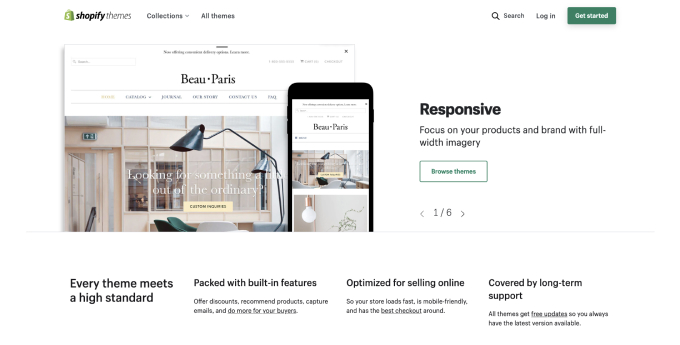
Leave a Reply
You must be logged in to post a comment.